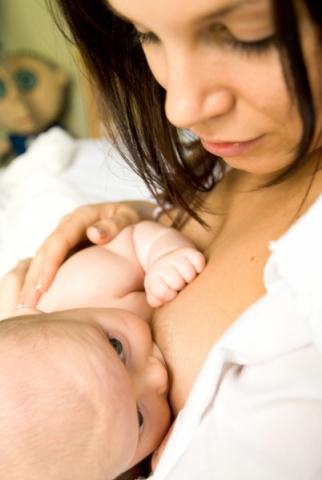Breastfeeding rates in Northern Ireland 'increasing'

The Public Health Agency (PHA) is using National Breastfeeding Awareness Week (NBAW) to highlight the message that breastfeeding can make a real difference to the health of both mothers and babies. Also, that more mothers here are going home from hospital breastfeeding - with an increase from 40% in 2005 to 44% in 2008.1
While this upward trend is good news, the PHA is also aware that breastfeeding rates are much lower among young mothers and those living within deprived areas.2 Figures for Northern Ireland show that breastfeeding rates on discharge from hospital for the most deprived areas are less than half of those for the least deprived.1
Janet Calvert, Regional Breastfeeding Coordinator at the PHA, said: "Northern Ireland has the lowest breastfeeding rate in the UK - with an average of 63% of women breastfeeding their baby at birth. By the time their baby is six months old, only 14% of mothers are still feeding this way. Young women under 20 years old have particularly low breastfeeding rates - with only 35% choosing to breastfeed from birth.2
"This is an issue that clearly needs addressed, as breastfeeding has many important health benefits for both mother and baby. These include a reduced risk of ear, chest, kidney and stomach infections and less risk of childhood diabetes and obesity. Breastfeeding can also significantly reduce the risk of hospital admission of children for gastroenteritis and chest infections. The health benefits for mothers who choose to breastfeed include a reduced risk of developing illnesses such as breast cancer, ovarian cancer and osteoporosis".3,4
With the right support, young mothers can succeed with breastfeeding. Emma Thompson, age 21 and from Bangor, is breastfeeding her six week old baby son Alfie. "I think breastfeeding is brilliant - it has given me a great bond with Alfie. It takes time and patience at the beginning, but my mum breastfed and only for her support I probably would have given up", she said.
Some of the reasons why women young mothers and those with low income decide not to breastfeed include: lack of awareness about the importance of breastfeeding, never having considered it an option, embarrassment, previous bad experience with breastfeeding, and lack of support from family and friends.
The PHA continues to address this public health issue across Northern Ireland by working regionally and locally to provide information and support for expectant and new parents.
"There are many local initiatives to improve breastfeeding support and these include improving support in the health service and through Sure Start programmes which work in areas of need to help ensure children get the best start in life," added Janet.
"Mother to mother peer support programmes are in place in many areas and are working with expectant and new mothers to help more mothers breastfeed for longer. We also have 70 breastfeeding support groups which provide ongoing support for breastfeeding mothers throughout Northern Ireland.
"The PHA is also working to improve attitudes to breastfeeding in public through the Breastfeeding Welcome Here scheme which has over 200 businesses and public facilities signed up to support and welcome breastfeeding families. All these initiatives along with support from partners and family are vital to help expectant and new mothers stay with breastfeeding and particularly for those who are least likely to breastfeed."
For further information on breastfeeding visit www.breastfedbabies.org.uk
ENDS
Notes to the editor
Janet Calvert will be available for interview during NBAW. Please phone PHA Press Office to arrange interview.
Source
1 Northern Ireland Child Health System 2005-2008. Deprivation deciles calculated using 2005 MDM.
2 Bolling K, Grant C, Hamlyn B, Thornton A. Infant feeding survey 2005. London: The Information Centre, 2007.
3 Ip S, et al. Breastfeeding and Maternal Health Outcomes in Developed Countries. AHRQ Publication No. 07-E007. Rockville: Agency for Healthcare Research and Quality, 2007.
4 Horta B et al. Evidence on the long-term effects of breastfeeding. Geneva: World Health Organisation, 2007.
For further information contact
PHA Press Office on 028 9031 1611.
